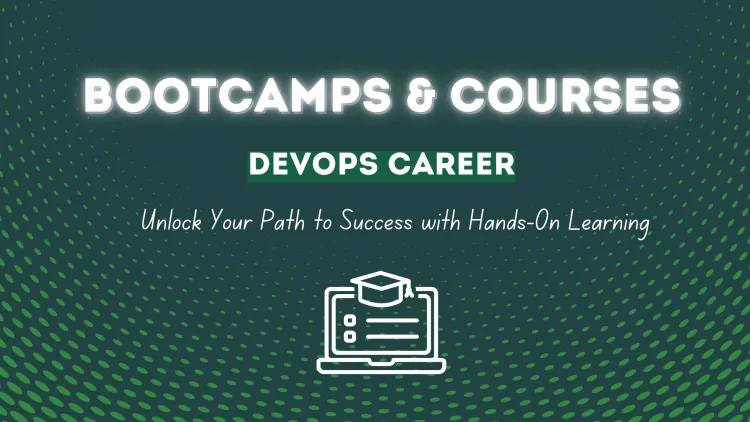How Online Courses and Bootcamps Can Prepare You for a Thriving Career in DevOps ?
Online courses and bootcamps for DevOps are excellent opportunities to gain essential skills and certifications. They offer flexible schedules, hands-on learning with tools like Docker, Kubernetes, and Jenkins, and prepare learners for certifications like AWS Certified DevOps Engineer. Platforms like Coursera, WebAsha Technologies, and KodeKloud provide industry-relevant training, catering to beginners and advanced learners. With cost-effective options, practical labs, and career support, these programs make DevOps accessible to all. By choosing the right platform, you can build a strong foundation and advance in this high-demand field.

In today’s fast-paced tech world, DevOps has emerged as one of the most sought-after disciplines, transforming the way software is developed, tested, and deployed. For individuals aspiring to build a career in this field, online courses and bootcamps provide a flexible and comprehensive way to gain essential DevOps skills. In this blog, we’ll dive into the benefits of these programs, highlight top platforms offering them, and guide you on selecting the right course or bootcamp.
Why Consider Online Courses or Bootcamps for DevOps?
Online courses and bootcamps have become popular due to their flexibility, affordability, and ability to deliver hands-on learning experiences. Here are the primary benefits:
1. Flexibility
- Learn at your own pace: Most online programs allow self-paced learning, making them ideal for working professionals.
- Varied schedules: Live classes, recorded lectures, and weekend options cater to diverse needs.
2. Cost-Effectiveness
- Online programs are generally more affordable than traditional degree courses.
- Some platforms even offer free introductory courses or financial aid.
3. Access to Industry Tools
- Courses and bootcamps provide training in popular DevOps tools like Docker, Kubernetes, Jenkins, and Terraform.
- Many include virtual labs for hands-on practice.
4. Certification Opportunities
- Many programs prepare learners for globally recognized certifications like:
- AWS Certified DevOps Engineer
- Docker Certified Associate (DCA)
- Certified Kubernetes Administrator (CKA)
5. Focused Learning
- Programs are designed to align with specific career paths, such as DevOps Engineer, Cloud Engineer, or Site Reliability Engineer (SRE).
Top Platforms Offering Online Courses and Bootcamps for DevOps
Here’s a table summarizing some of the best platforms and their features:
| Platform | Best For | Key Features | Highlight |
|---|---|---|---|
| Coursera | Beginners | Courses from universities like Stanford and IBM, flexible schedules | Financial aid available for many programs |
| Udemy | Budget learners | Affordable courses starting at $10, lifetime access | Wide range of beginner to advanced topics |
| Pluralsight | Intermediate learners | Extensive DevOps catalog, hands-on labs | Skill assessments to measure progress |
| AWS Training & Certification | Cloud DevOps | Official AWS courses, certification prep | Focused on AWS tools and services |
| Linux Academy (A Cloud Guru) | Hands-on practice | Interactive labs, sandbox environments | Highly recommended for cloud-based DevOps training |
| DevOps Institute | Certification prep | Comprehensive courses for certifications like DevOps Foundation, DCA | Vendor-neutral content |
| Simplilearn | Career-focused learners | Job-ready bootcamps, industry-recognized certifications | Includes capstone projects |
| KodeKloud | Hands-on learners | Interactive labs, Kubernetes-focused training | Real-world problem-solving exercises |
| WebAsha Technologies | Beginners to Advanced | Training on key DevOps tools like Jenkins, Kubernetes, and Docker | Includes mentorship and practical projects |
| edX | Academic learning | University courses in collaboration with leading institutions | Certification programs with theoretical and practical content |
How to Choose the Right Course or Bootcamp
With numerous options available, selecting the right program can feel overwhelming. Here’s how to decide:
1. Assess Your Skill Level
- Beginners: Look for introductory courses that cover the basics of Linux, scripting, and version control.
- Intermediate/Advanced: Opt for specialized programs focused on tools like Kubernetes, Terraform, or CI/CD pipelines.
2. Consider Certification Goals
- If earning a certification is your goal, ensure the course aligns with the certification’s syllabus.
3. Check Hands-On Opportunities
- Prioritize programs with practical labs, virtual sandboxes, or project-based learning.
4. Look for Mentorship and Career Support
- Bootcamps like Simplilearn and WebAsha often include career guidance and mentoring.
5. Read Reviews
- Platforms like Reddit, Trustpilot, or LinkedIn can provide honest feedback about program quality.
Benefits of Online Courses and Bootcamps for DevOps
- Skill Development: Learn key concepts like CI/CD, Infrastructure as Code, and cloud deployment.
- Networking Opportunities: Interact with instructors and peers in live classes or forums.
- Job Readiness: Certifications and project portfolios enhance your job prospects.
Challenges of Online Learning
While online courses and bootcamps are effective, they come with challenges:
- Self-Discipline: Requires commitment and good time management.
- Cost for Premium Programs: High-quality bootcamps can be expensive.
- Lack of Face-to-Face Interaction: Some learners prefer in-person learning environments.
Conclusion
Yes, there are online courses and bootcamps for DevOps, and they are excellent pathways to build the skills and certifications required for a thriving career. By choosing the right program, dedicating time to hands-on practice, and working on real-world projects, you can prepare yourself for exciting opportunities in the DevOps field. Platforms like Coursera, WebAsha Technologies, and KodeKloud offer a mix of theoretical and practical learning tailored to industry needs.
Start exploring today, and take the first step toward becoming a skilled DevOps Engineer!
FAQs
-
What is DevOps, and why is it in demand?
DevOps is a software development approach combining development and operations to improve delivery speed and quality, making it crucial for modern businesses. -
Are online courses effective for learning DevOps?
Yes, online courses are effective because they offer flexibility, hands-on labs, and industry-recognized certifications. -
What are the most popular tools taught in DevOps training?
Common tools include Docker, Kubernetes, Jenkins, Terraform, Ansible, and AWS services. -
What’s the difference between online courses and bootcamps?
Online courses are often self-paced and cover specific topics, while bootcamps are more intensive and focus on job readiness. -
Do online DevOps programs provide certifications?
Many programs prepare learners for certifications like AWS Certified DevOps Engineer and Docker Certified Associate. -
Can beginners enroll in DevOps bootcamps?
Yes, many bootcamps are designed for beginners and offer foundational courses before diving into advanced topics. -
How long does it take to complete a DevOps course or bootcamp?
It varies—online courses may take weeks, while bootcamps typically last 3 to 6 months. -
Are there free DevOps training programs?
Yes, platforms like KodeKloud and AWS offer free introductory courses and labs. -
How do I choose the best DevOps program?
Assess your skill level, check for hands-on practice opportunities, and ensure the program aligns with your career goals. -
What is unique about WebAsha Technologies for DevOps training?
WebAsha provides mentorship, practical labs, and project-based learning tailored to beginners and professionals.












![Top 10 Ethical Hackers in the World [2025]](https://www.webasha.com/blog/uploads/images/202408/image_100x75_66c2f983c207b.webp)

![[2025] Top 100+ VAPT Interview Questions and Answers](https://www.webasha.com/blog/uploads/images/image_100x75_6512b1e4b64f7.jpg)









